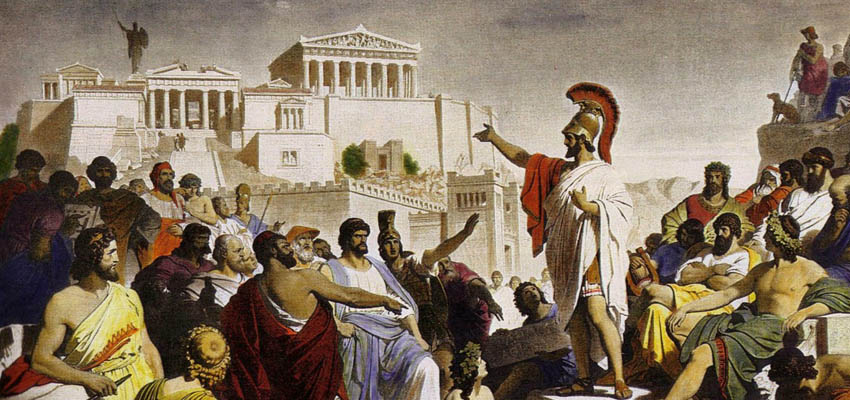
Is America Experiencing a Leadership Crisis?
People complain that our leaders aren’t what they used to be. How about We the People – are we blameless?
These days, it feels as though the the cycle of blame spins faster and faster with each passing crisis. We can’t finish with one moral outrage before we dive into another. And our leaders – where are they? Not only do they seem less competent and their decisions less likable, but to a wider swath of voters, they appear to be bungling, corruptible gaggles of divisive partisans. Is it really them or is it us? If it is us, what can we do about it?
Let’s address a few things first. History is a poor measure of leadership. The qualities we like in our elected leaders (for instance) are generational. Moreover, as Winston Churchill observed, “History is written by the victors.” No matter how hard we try, there will always be accusations of bias in documenting history. Unless you were there – and I’m mean ‘really’ there – how do you know how well (or badly) decisions were made? Even if you were there, how do you know it was the right decision without being prescient? Just because it all turns out well doesn’t mean there was a auspicious display of leadership. You may have just been lucky.
When penning an article like this, there’s always the temptation of laying out lofty ideals stitched together with prosaic “brainy” quotes from the likes of Tolstoy (Writing laws is easy, but governing is difficult) and Santayana (Those who do not remember the past are condemned to repeat it). I’ve attempted my inquiry to include examples of failure. Moreover, I believe I can filter out some of the expected bias of history by looking into the ancient world.
Amid the ancient decaying streets of Athens is an epic story of decline. Here, it’s not about leaders – per se – but the gradual disengagement by people who were willing to follow. Perhaps it was the disengagement that led to a drop in inspirational leadership, or maybe it was the other way around, these are nuances we cannot know. We do know, however, that in ancient Athens, the precursor to its downfall began as a crisis in leadership.
The great Athenian statesman Pericles saw his generals increasingly unable to enforce laws and maintain order. People sensed disruption and many lost the motivation to perform civic duties and act as a united people. Reading ancient records, we know – for instance – that many people sought ways to avoid serving on juries, civic counsels, and the draft. By the time Pericles left office, the Greek army had experienced cowardice on the battlefield – behavior unthinkable only ten years before. Some soldiers even mutinied. And each successive leader after Pericles was less efficient at leading and less effective at governing. Oligarchic regimes rose up, and citizens – feeling marginalized – became more and more disaffected.
This story ought to resonate with all Americans. Perhaps our story is not quite pegged to a citizenry gradually becoming complacent, but one so stratified in their opinions that they are complacent in their attitude toward long-held traditions and institutions. While we argue over ideology, are we not thus opened to abuses within our own democracy?
In Nairobi, Kenya – where democracy flourished under a Herculean effort to form a fair constitution – now they’re reeling from hard lessons on bad leadership and people with poor attitudes. Writer Larry Madowo writes this article to ask if the citizenry can truly ask more from their leadership than they are willing to give themselves. I was struck by the deeper intent of his question. Madowo is taking aim at serial cases of corruption in government and pointing the finger of blame squarely back at the governed.
If we were not lying, thieving, morally inept people in our own private lives, we would have the moral authority to criticise our leadership.
A stinging rebuke of what he sees as a society that has collapsed its sense of fairness, which in a democracy could be fatal. He goes on by citing examples of corruption – small and large – egged on by citizens who fight tooth and nail for their turn to take as they please. His frustration bubbles over as he wonders if his fellow citizens – who have only a limited understanding of basic issues – can be trusted to select capable leaders. If citizens are themselves corrupt, what else will they do than to create a corrupt government?
Subir Chowdhury, who has spent many years as a quality management consultant for many of the world’s largest manufacturers, puts another spin on Madowo’s thesis. In a post titled Who’s Political Crisis is This Anyhow? Chowdhury identifies citizen’s willingness to take an active participation in government. He decries “political theater” as an impediment that prevents leadership from advancing away from ideology and toward real and sustainable change.
No business survives long making decisions in that way. From my perspective as a management consultant for more than twenty years, it is clear that our current government is focused on putting up barriers instead of tearing them down and creating opportunities.
He points out that two of the least productive congressional sessions (the 112th and 113th) occurred DURING the last four years of the Great Recession. Subsequent sessions have been more productive, but partisanship is always gnashing at the margins with threats of shutdowns, vetos, or worse – wasteful radical change when there is party change over. Chowdhury doesn’t take a side. His critique is a harsh nonpartisan rebuke of American voters.
The root cause of the current failure in Congress and the White House is our own — we lack a true understanding of what is going on and are not engaged in any significant way. To me, the threat of failure is clear and the answer obvious. We either build up and strengthen the very foundations of this great democracy, or leave things as they and allow the country to continue to erode.
Blame accomplishes nothing. Yet, the citizenry is focused on blame because blame is what fuels politics. Candidates use the very devices that gets people riled up, and the people are ready (and willing) to castigate the ideology of opposition at every turn. The NET result is that we stop functioning as a country. Valuable taxpayer resources are wasted and our accomplishments are fewer and fewer.
The tiresome cycle of the jeu de blâme goes on and on. It’s a feedback loop missing the impetus to do better and improve. Tragically, as it spins faster and faster, it takes on the character of a death spiral into the abyss.
Can we recognize what Chowdhury identifies as “our collective failure to recognize poor judgment” and work past petty ideologies? Can we recognize bad decisions for what they are and demand better from ourselves to engage a process that builds better leadership? I guess I wouldn’t have posted this if I were confident that we can.
About: Ray Wyman, Jr is a content creator, communications professional, and author with more than 30 years of experience. Visit LinkedIN or Raywyman.com for more information.


